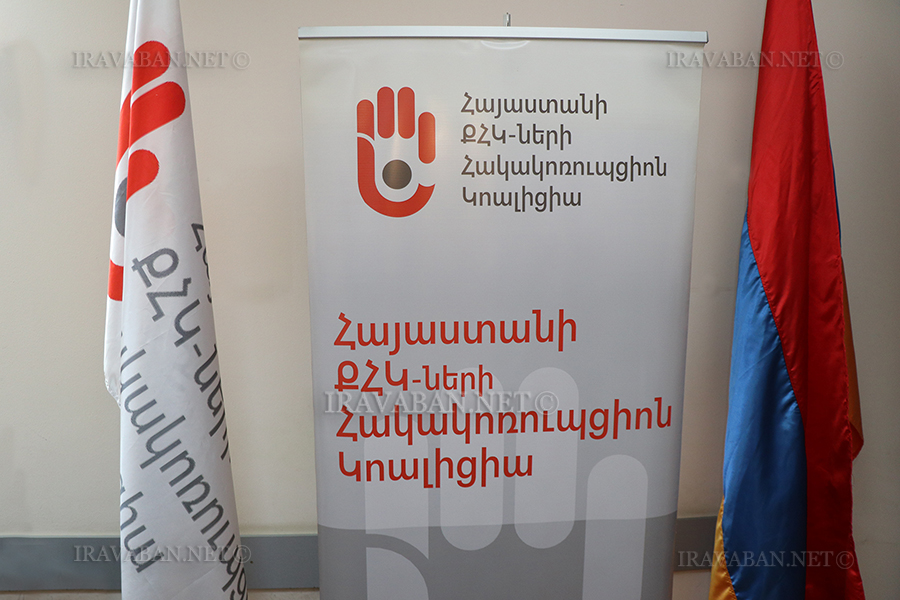Statement of CSOs Anti-Corruption Coalition of Armenia on the RA Draft Law “On Making Amendments to the RA Law on Freedom of Information” approved on the 2 April, 2020 sitting of the RA Government.”
Dear Colleagues,
On the 2 April, 2020 sitting, the Government of the Republic of Armenia approved and submitted to the National Assembly in accordance with the established procedure the Draft Law of the Republic of Armenia “On Making Amendments to the Law of the Republic of Armenia on Freedom of Information” (hereinafter referred to as the Draft). The Draft proposes to supplement Article 8 of the RA Law on Freedom of Information, which deals with restrictions on freedom of information, with Part 4, with the following content:
“Providing information on the environment may be denied if it may adversely affect the environment, including the breeding sites of rare species.”
According to the justification attached to the Draft; the Draft was developed in accordance with the international obligations undertaken by the Republic of Armenia, in particular, under the “Convention on Access to Information, Public Participation in Decision-making and Access to Justice in Environmental Matters” (hereinafter the Aarhus Convention), signed by the Republic of Armenia on 25 June, 1998 in Aarhus, Denmark, and ratified on 27 June, 2001, implementation and approximation of the provisions of Article 4 (4) (h) in the domestic legislation.
Regarding the above, we first consider it necessary to state in the justification of the Draft that the provisions of the articles of the Aarhus Convention are selective and partial, which does not allow us to assess whether the requirements of the provisions of the Aarhus Convention must be implemented by our domestic legislation. Or is it possible that the Convention allows countries that have ratified it to adopt other approaches?
For example, according to Article 3 (5) and (6) of the Aarhus Convention, entitled “General Provisions”:
“5. The provisions of this Convention shall not affect the right of a Party to maintain or introduce measures providing for broader access to information, more extensive public participation in decision-making and wider access to justice in environmental matters than required by this Convention.”
“6. This Convention shall not require any derogation from existing rights of access to information, public participation in decision-making and access to justice in environmental matters.”
This indicates that the current provisions of Article 8, Part 3, Clause 2 of the RA Law on Freedom of Information, according to which the provision of information cannot be rejected if it presents the overall economic situation of the Republic of Armenia, as well as the real situation in the spheres of nature and environment protection, health, education, agriculture, trade and culture; suggests that the Republic of Armenia legislative regulations provide a wider guaranteed level of information availability on environmental issues are more justified than possible restrictions under the Convention. Therefore, the regulations related to definition of environmental restrictions in the Draft, agreeing with the requirements of the Aarhus Convention is unfounded.
Second. A number of articles of the RA Constitution (12th, 42nd, 51st) are cited in the justification of the Draft, but the competent body developing the Draft, defining such regulations by the Draft, did not comply with the requirements of Articles 78 and 79 of the RA Constitution, in particular:
- Pursuant to Article 78, the means chosen for restricting basic rights and freedoms must be suitable and necessary for achievement of the objective prescribed by the Constitution. The means chosen for restriction must be commensurate to the significance of the basic right or freedom being restricted.
- Pursuant to Article 79, when restricting basic rights and freedoms, laws must define the grounds and extent of restrictions, be sufficiently certain to enable the holders and addressees of these rights and freedoms to display appropriate conduct.
In this regard, we find that the justification of the Draft does not sufficiently disclose the extent to which the provisions of the Draft on restricting the provision of information on the environment by law are suitable and necessary in their nature.
The Draft does not define the necessary organizational structures and procedures for restricting the freedom of expression and the right to receive information of a person guaranteed by the Constitution, as well as does not specify in which cases the authorized body may refuse to provide information on the environment: thus in this way, preparing fertile ground for possible disproportionate restrictions, which, could, among other things, harm nature itself.
From the very first day of the publication of the project, many civil society organizations, environmentalists and journalists have warned of the dangers of regulations proposed by the Draft, stressing that it provides the discretionary authority to the authorized body to reject providing any information related to the environment.
Therefore, we call to stop the circulation of the above-mentioned Draft in the current state of emergency, to organize proper public and professional discussions on it after the termination of the state of emergency.
Governing Board of the CSO Anti-Corruption Coalition of Armenia
“NGO Center” Civil Society Development NGO,
“Union of Advanced Technology Enterprises” NGO,
“Armenian Association of Young Doctors” NGO,
“Rights and Freedom Center” NGO,
“Center for Economic Rights” NGO,
“Tukhmanuk Human Rights and Education Center” NGO,
“Union of Communities of Armenia” NGO,
“Support for Equal Opportunities Foundation”,
“Armenian Lawyers’ Association” NGO, Coordinating Secretariat.
The statement was accepted at a distance meeting of the Governing Board of the CSO Anti-Corruption Coalition of Armenia.
06.04.2020″ the statement reads.















